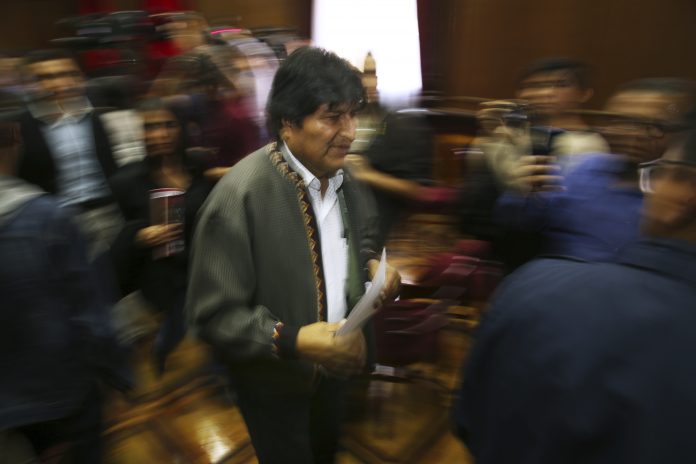
The political movement of former President President Evo Morales says it will seek consensus candidates for its presidential ticket in the country’s new elections and will spend at least a month more consulting its bases.
The announcement came after a gathering Saturday of the Movement Toward Socialism, or MAS, in the central city of Cochabamba failed to decide on candidates.
Party leaders said Morales would be its campaign chief for the elections, which were called when a Oct. 20 vote in which Morales’ claimed victory to a fourth straight term was canceled. The date of the new vote has not yet been set.
Party communications secretary Gualberto Arispe said the decision on candidates would be postponed until the next gathering in a month’s time.
In the meantime, the party will consult with its social and indigenous bases to find consensus candidates, MAS lawmaker Juan Cala said.
“There are different currents, some which want to rapidly name a pair (of candidates), but no. The time that is necessary needs to be taken, because the candidates need to emerge from the social, indigenous bases,” Cala said.
Meanwhile, two opposition figures who had led anti-Morales protests —- Luis Fernando Camacho and Marcos Pumari — decided that they will each mount presidential candidacies and not run together. Former President Carlos Mesa still hasn’t said who his running mate will be.
Morales was Bolivia’s first indigenous president and after being informed of the decision to name him campaign chief for MAS, he told his followers by telephone that “soon I will be in Bolivia so that we can face the elections together and win them.”
On his Twitter account, Morales accepted the post and thanked his supporters.
“We will choose a united candidate and again we will win the elections in the first round. Thank you for not abandoning me, I will always be with you. Together we will continue making history,” he tweeted.
The MAS gathering took place three weeks after Morales resigned at the urging of the military and flew to Mexico, which gave him political asylum. He is currently in Cuba for a medical appointment.
Morales, who governed Bolivia for almost 14 years, contends he was ousted in a coup d’état.
His critics say he illegally sought a fourth term in office and used fraud to win the Oct. 20 vote. An Organization of American States’ report found evidence of irregularities and manipulation in the vote.
After Morales resigned under pressure from the military, Sen. Jeanine Áñez assumed the presidency temporarily for 90 days.q



















